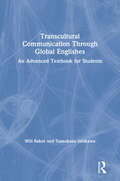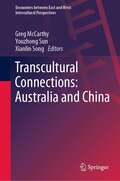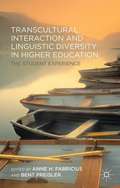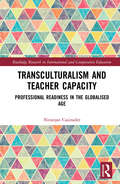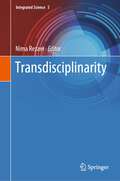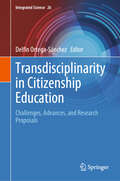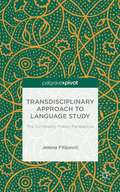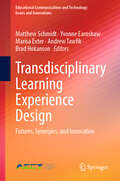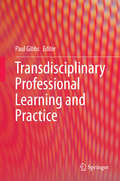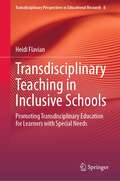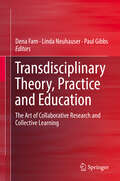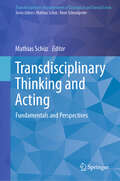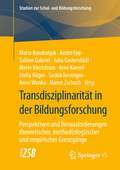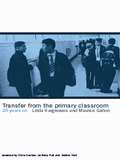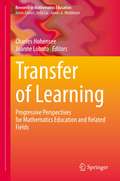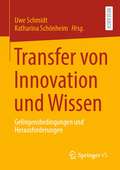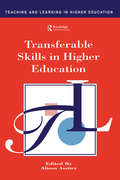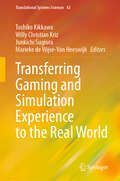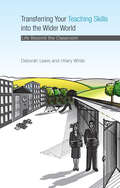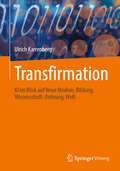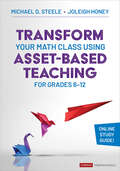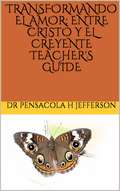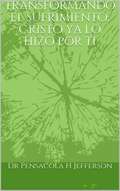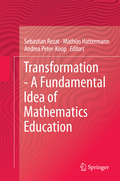- Table View
- List View
Transcultural Communication Through Global Englishes: An Advanced Textbook for Students
by Will Baker Tomokazu IshikawaThis textbook introduces current thinking on English as a global language and explores its role in intercultural and transcultural communication. It covers how English functions as a lingua franca in multilingual scenarios alongside other languages in a wide variety of global settings, and the fluid and dynamic links between English, other languages, and cultural identities and references. The implications for English language teaching (ELT), academia, business, and digital communication are explored. Contemporary research and theory are presented in an accessible manner, illustrated with examples from current research, and supported with discussions and tasks to enable students to relate these ideas to their own experiences, needs, and interests. Each chapter contains activities to help students orientate towards the topic, reflect on personal experiences and opinions, and check their understanding; Additionally, a detailed glossary of key terminology in Global Englishes and Intercultural Communication is provided. Exploring in depth the links between Global Englishes, Intercultural Communication research, and Transcultural Communication reasearch, this is key reading for all advanced students and researchers in Global or World Englishes, English as a Lingua Franca (ELF), and Intercultural Communication.
Transcultural Connections: Australia and China (Encounters between East and West)
by Xianlin Song Youzhong Sun Greg McCarthyThis book is a unique and original contribution to the knowledge of transcultural engagement between the ‘East’ and the ‘West’; notably between China and Australia.The collection explores how the global system universally interrelates East and West, showing how this interrelatedness offers the promise of progress but can evoke the counteracting trend of tribal nationalism. The book addresses the connectedness of human progress by exploring how globalization creates new dynamic interfaces between East and West and how rather than clashes of culture there are growing forms of reciprocity between civilizations and a shared awareness of how humanity is connected through knowledge and international mobility.
Transcultural Interaction and Linguistic Diversity in Higher Education
by Anne H. FabriciusIncreasing numbers of university students are travelling the globe in search of experiences and qualifications that will ensure their future in many different workplaces. In a world of linguistic diversity, what challenges do they meet, and what barriers, visible and invisible, do they have to overcome? This book presents sociolinguistic research on students' experiences of studying abroad. It gives accounts of students' own expectations, their personal social and psychological developmentsin challenging international study contexts, the demands they face and the breakthroughs they make. Using a range of research methods, the studies illuminate the many linguistic and educational issues that can confront anyone choosing to study or work abroad. It provides a fascinating inside view of the ramifications of a globalized and linguistically diverse educational market from the point of view of those coming of age within it.
Transculturalism and Teacher Capacity: Professional Readiness in the Globalised Age (Routledge Research in International and Comparative Education)
by Niranjan CasinaderBased on new research data, with a 135-teacher study over 8 countries, this book challenges the assumption that all teachers automatically have the expertise to teach cultural understanding and argues, instead, that there is the need for teachers to acquire transcultural expertise to teach cultural understanding effectively in the present age, rather than depending on current multicultural and intercultural approaches. By outlining a new model to teach cultural understanding that is appropriate and relevant, this volume focuses on the expertise of teachers to address this gap in current teaching practice. Using the framework of education in Britain and its former empire, this book traces the role that teachers have played in teaching cultural understanding throughout history, and then uses the results of a recent international research project to outline recommendations for teacher education and professional learning that both develop and enhance the ability of teachers to address cultural understanding effectively in their work. Transculturalism and Teacher Capacity: Professional Readiness in the Globalised Age is the perfect resource for any researcher, school leader and educational administrator, or those interested in education that prepares teachers to meet the demands of the profession in the current age.
Transdisciplinarity (Integrated Science #5)
by Nima RezaeiThis contributed volume book aims at discussing transdisciplinary approaches to address common problems. By working transdisciplinarily, researchers coming from different disciplines can work jointly using a shared conceptual framework bringing together disciplinary-specific theories and concepts. There are numerous barriers that can obstruct effective communication between different cultures, communities, religions and geographies. This book shows that through bringing together different disciplines, researchers not only can surpass these barriers but can effectively produce new venues of thought that can positively affect the development and evolution of research and education. The book discusses new and emerging applications of knowledge produced by transdisciplinary efforts and covers the interplay of many disciplines, including agriculture, economics, mathematics, engineering, industry, information technology, marketing, nanoscience, neuroscience, space exploration, human-animal relationships, among others. Consequently, it also covers the relationship between art and science, as one of the most remarkable transdisciplinary approaches that paves the way for new methods in engineering, design, architecture and many other fields.
Transdisciplinarity in Citizenship Education: Challenges, Advances, and Research Proposals (Integrated Science #26)
by Delfín Ortega-SánchezThis edited volume provides a thorough theoretical reflection and practical application of the concept of transdisciplinarity, crucial for understanding and effectively addressing contemporary complex socio-scientific issues, and in fostering robust social and civic competencies. From this viewpoint, its seven chapters reveal that such competencies can be developed through didactic-disciplinary areas that, at first glance, may seem removed from the traditional focuses of scientific education. The volume not only presents evidence of the necessity for cross-disciplinarity and the importance of integrating various disciplines into the educational process but also details specific didactic approaches based on holistic and contextualized learning. These approaches, especially beneficial for pre-service and active teachers in primary and secondary education, enable a more effective response to current challenges, promoting an educational model that prepares students to act as informed, critical, and engaged citizens in an increasingly complex and globalized society.
Transdisciplinary Approach to Language Study: The Complexity Theory Perspective
by Jelena FilipovićThis book is about complexity-driven, trandsisciplinary approach to language study. It illustrates how complexity science can be applied in the research of language and society in order to create and sustain a transdisciplinary dialogue across interested communities of practice which may be beneficial in improving living conditions of real people.
Transdisciplinary Learning Experience Design: Futures, Synergies, and Innovation (Educational Communications and Technology: Issues and Innovations)
by Brad Hokanson Matthew Schmidt Marisa Exter Yvonne Earnshaw Andrew TawfikThis book is explores the evolving field of Learning Experience Design (LXD). It provides a multifaceted view of LXD, incorporating perspectives from instructional design, educational technology, and beyond, reflecting the transdisciplinary nature of this design approach. This edited volume responds to the growing recognition of LXD as a distinct area of study and practice within instructional design, especially in the context of rapid technological advancements and changing educational landscapes. The subject of this work is Learning Experience Design, a field integrating multidisciplinary knowledge and techniques to create effective, enjoyable, and meaningful learning experiences. The book delves into participatory and co-design, innovative LXD methods, learning-focused usability research, and theoretical and conceptual advancements in LXD. It features design cases that provide real-world insights and applications, making the content rich and relatable for researchers and practitioners alike. Readers will find the sections on participatory design, innovative methodologies, and the transdisciplinary synergies of particular interest. These areas represent areas of LXD that are in need of further investigation, so as to better illuminate how learning experiences can be conceptualized, implemented, and evaluated. The edited volume’s inclusion of learning-focused usability research offers readers further insights into how learners interact with designed learning experiences, highlighting how insights from such studies can lead to ongoing improvements and foster considerations for future designs. The main benefit readers will derive from this work is a deep, nuanced understanding of current and emerging trends in LXD. Practitioners will gain a wealth of practical strategies and insights to apply in their own work; scholars and students will discover a rich source of theoretical and empirical knowledge to advance both research and practice. The book serves as a catalyst for innovation and cross-disciplinary collaboration, inspiring readers to explore new territories in the learning experience design. This book offers a comprehensive, insightful, and forward-looking exploration of the field. It will complement the growing corpus of LXD literature, providing both breadth and depth on this dynamic and influential approach to learning design.
Transdisciplinary Professional Learning and Practice
by Paul GibbsThis book presents thinking about and through transdisciplinary and professional development as an educative process. Rather than focusing on the delineation of the approaches offered, an analysis of these contributions points to commonality in those problems that benefit from a transdisciplinary perspective. The core elements of transdisciplinarity can lead to what might be called metanoia - another way of knowing; a knowing which is 'beyond that which is creative and transformative. This poses challenges for the practice of all professionals and is the core issue that this book addresses. The book brings together the constituting views of transdisciplinarity, or metanoia, and focus them on current professional practice. The book is structured in two parts and five sections. The first part deals with key issues in Transdisciplinarity; its actuality and how it creates knowledge. Section 1 has three original papers which look at Transdisciplinarity from a different lens. Especially, the Islamic voice has not been heard in this context before. Section 2 considers the knowledge aspect of Transdisciplinarity and how this might be confronted with existing disciplinary knowledge. Part 2 of the book is directly focused on professionals and their education. The third section considers research pedagogy and graduate education for the professional. This is followed in section 4 which offers a discussion on team work. In the final section six chapters present the transdisciplinary practitioner in different contexts.
Transdisciplinary Teaching in Inclusive Schools: Promoting Transdisciplinary Education for Learners with Special Needs (Transdisciplinary Perspectives in Educational Research #8)
by Heidi FlavianThis book offers opportunities for better understanding teachers’ unique challenges when planning teaching sessions for learners with special needs, based on the transdisciplinary approach. The work also presents some of the core learning strategies teachers may incorporate into their teaching processes in order to promote transdisciplinary learning among learners with special needs.From a theoretical perspective, this book discusses a variety of advantages and disadvantages transdisciplinary educators may encounter, and promotes educators' development of their own vision of this area. Although the concept of special needs is often over-generalized, this book relates to the most common types of special needs among learners who study in inclusive schools: learners from different cultural background, learners with Attention Deficit Hyperactive Disability (ADHD), learners with Autism Spectrum Disorder (ASD), and learners with sensory or motor challenges. A special chapter is dedicatedto each of those groups in order to closely examine how teachers can teach those learners according to the transdisciplinary approach in practice, in inclusive classrooms. While each chapter presents different perspectives of learners with special needs, the book’s summary integrates them all and highlights the commonalities between the various needs.
Transdisciplinary Theory, Practice and Education: The Art Of Collaborative Research And Collective Thinking
by Paul Gibbs Dena Fam Linda NeuhauserThis exciting new state-of-the art book reviews, explores and advocates ways in which collaborative research endeavours can, through a transdisciplinary lens, enhance student, academic and social experiences. Drawing from a wide range of knowledges, contexts, geographical locations and internationally renowned expertise, the book provides a unique look into the world of transdisciplinary thinking, collaborative learning and action. In doing so, the book is action orientated, reflective, theoretical and intriguing and provides a place for all of these to meet and mingle in the spirit of curiosity and imagination.
Transdisciplinary Thinking and Acting: Fundamentals and Perspectives (Transdisciplinary Management of Ecological and Social Crises)
by Mathias SchüzComplex problems can only be overcome with complex solutions. This dictum by Albert Einstein also applies to current world problems such as climate change, species extinction, the littering of our planet, and the growing gap between rich and poor. They overwhelm individual scientific disciplines. Therefore, they can only be solved through transdisciplinarity, i.e. beyond the individual disciplines in interaction with empirical knowledge of different provenance and philosophical reflection. This first volume of the book series "Transdisciplinary Management of Social and Ecological Crises" explains how transdisciplinarity is to be understood in general, what approaches exist, and how they contribute to solving the various world problems. In this context, the book addresses, among other things, the replacement of man's claim to dominion over nature, the overcoming of culturally determined boundaries in human communities, and integrative and agile management methods in business, politics, art, and society. It deals with a sustainable circular economy, new forms of politics in the interest of all instead of a few, learning from artists, healthy and environmentally sound nutrition, and spiritual mindfulness in dealing with oneself and other ways of life. Thus, the book is aimed at a broad audience from different disciplines interested in the perspective of and interaction with other disciplines to solve global problems. Chapter "Methodology of Transdisciplinarity–Levels of Reality, Logic of the Included Middle and Complexity" is available open access under a Creative Commons Attribution 4.0 International License via link.springer.com.
Transdisziplinarität in der Bildungsforschung: Perspektiven und Herausforderungen theoretischer, method(olog)ischer und empirischer Grenzgänge (Studien zur Schul- und Bildungsforschung #91)
by Merle Hinrichsen Julia Gasterstädt Saskia Terstegen Anna Wanka Maren Zschach Sabine Gabriel Maria Kondratjuk André Epp Arne Koevel Stella RügerDer Band diskutiert Implikationen der Transdisziplinarität für die Bildungsforschung und zeigt die darin angelegten Grenzen und Grenzüberschreitungen auf. Er reflektiert aktuelle Themen- und Problemstellungen, die sich mit Blick auf die heterogenen Perspektiven in bildungs- und erziehungswissenschaftlichen Disziplinen zu Transdisziplinarität ergeben. So stehen theoretische, method(olog)ische und empirische Grenzgänge im Fokus, die sowohl mit einer Eingebundenheit in spezifische fachliche Disziplinen und die daran geknüpften wissenschaftstheoretischen Positionen als auch mit der Notwendigkeit eines Blickens ‚über den Tellerrand hinaus’ einhergehen. Ziel ist es, Bezüge, Anleihen und Anknüpfungspunkte, Unschärfen, Irritationen, Voraussetzungen und Herausforderungen für eine transdisziplinäre Bildungsforschung aufzuspüren und abzubilden.
Transfer from the Primary Classroom: 20 Years On
by Linda Hargreaves Maurice GaltonThe ORACLE (Observation and Classroom Learning and Evaluation) and its follow-up study address the following questions:Has teaching in the primary school changed over the past twenty years?Has pupil performance improved or declined?Are the links between certain teacher approaches and pupil achievement still the same?Has the National Curriculum had any important consequences for the way in which transfer is conducted?One of the main claims of the National Curriculum is that it has provided greater continuity through the various stages and this should be reflected in smoother transition from one school to the next. This book focuses on the issue of transfer from the primary to the secondary school, using data from the ORACLE project.This study which took place from 1975 to 1980, followed by 'Son of ORACLE', the study of group-work in the primary classroom 1980 to 1983, has had an enormous influence on the debate on primary education. The studies described in detail what took place in primary classrooms, the teaching styles used by teachers and the responses made by pupils. It linked these processes to pupil performance. Finally, it followed the pupils as they transferred out of the primary school into the secondary phase of education. At present a new research project is being carried out in Leicester. It involves studying primary schools for one year and then following the children as they transfer to the secondary phase or to a middle school. The project involves two thirds of the schools used in the original ORACLE research. In addition, the same observation instruments and the same tests, modified for cultural differences, are being used.
Transfer of Learning: Progressive Perspectives for Mathematics Education and Related Fields (Research in Mathematics Education)
by Charles Hohensee Joanne LobatoThis book provides a common language for and makes connections between transfer research in mathematics education and transfer research in related fields. It generates renewed excitement for and increased visibility of transfer research, by showcasing and aggregating leading-edge research from the transfer research community. This book also helps to establish transfer as a sub-field of research within mathematics education and extends and refines alternate perspectives on the transfer of learning. The book provides an overview of current knowledge in the field as well as informs future transfer research.
Transfer von Innovation und Wissen: Gelingensbedingungen und Herausforderungen
by Uwe Schmidt Katharina SchönheimOb und wie Ideen und Projekte aus Förderprogrammen an Hochschulen und in anderen Organisationen in die Breite transferiert werden, ist Gegenstand des vorliegenden Buchs. Ausgehend von einer theoretischen und methodischen Hinführung zum Thema Transfer werden Programme und Projekte vorgestellt, die sich der Übertragung innerhalb oder auch zwischen Hochschulen bzw. Organisationen widmen. Hierbei werden sowohl Herausforderungen als auch Gelingensbedingungen für Transfer in den Blick genommen. Die Praxiserfahrungen regen zum Nachmachen an.
Transferable Skills in Higher Education
by Alison AssiterThis text uses a case study approach to show how life-skills can be developed in a range of higher education subject areas. It also looks at the changes which can be made to the curriculum to facilitate this sort of learning. The case studies are set against a more theoretical background.
Transferring Gaming and Simulation Experience to the Real World (Translational Systems Sciences #43)
by Willy Christian Kriz Toshiko Kikkawa Junkichi Sugiura Marieke de Wijse-van HeeswijkThis book focuses on how to connect the gaming experience to the real world. Looking back at the history of the Simulation and Gaming field, it has offered the solution to social problems such as policy making, decision making for business strategies, education and training, environmental issues, urban planning, or disaster awareness. In other words, Gaming Simulation always has had a close connection to the reality. The interconnected modern societies nowadays have become even more complex and ambiguous, as the UN SDGs goals show. Gaming is one of the suitable tools to suggest ways to achieve our goals in a world of uncertainty. Learning starts by experiencing games and their effects in a safe environment. An important part of the gaming simulation process are methods for a transfer of the game-based learning to and an application within reality. However, connecting the experience to reality is not always facile for all the participants, no matter how comprehensive the debriefing is. In addition to debriefing, further transfer methods and conditions have to be implemented in order to create a real change of behavior and systems. The book's authors tackle the challenge by introducing concrete practices and offering various hints for readers struggling to solve a similar issue. In addition, when applying the experience of gaming, we have to carefully consider several ethical issues, which are also covered in this book.
Transferring your Teaching Skills into the Wider World: Life Beyond the Classroom
by Hilary White Deborah LewisAre you seeking to use your subject knowledge and teaching skills beyond the classroom? Many teachers don’t recognise the vast range of skills, expertise and experience they possess. Transferring your Teaching Skills into the Wider World will help you focus on how you can use your many transferable skills in a variety of contexts and settings across the educational sector and beyond. Deborah Lewis and Hilary White identify the skills developed through a teaching career and match them with the wide range of jobs open to teachers looking for a new direction. This highly practical handbook: Illustrates the diverse ways in which you can utilise your teaching skills and experience Surveys a wide variety of education related jobs and training options, using case studies to explore their advantages and disadvantages Explores the opportunities open to teachers seeking a complete career change Gives helpful advice for those wishing to develop their career within education The case studies are inspiring examples of individuals who have drawn on their teaching experiences to expand into other areas, describing the route they took and showing how they utilized their teaching expertise. Tips and hints show how you can follow a similar path. Transferring your Teaching Skills into the Wider World is essential reading for any teacher looking for guidance on how to change or develop their career whilst making the most of their existing skills and experience.
Transfirmation: KI im Blick auf Neue Medien, Bildung, Wissenschaft. Ordnung, Welt
by Ulrich KarrenbergDieses Buch widmet sich der Frage, wie KI als treibende Kraft in den Bereichen Medien, Bildung, Wissenschaft, gesellschaftlicher Ordnung und unserer globalen Welt wirkt. Es ist eine Einladung, nicht nur zu verstehen, was diese Technologien bewirken, sondern auch, welche Möglichkeiten und Herausforderungen sich daraus ergeben.
Transform Your Math Class Using Asset-Based Teaching for Grades 6-12 (Corwin Mathematics Series)
by Michael D. Steele Joleigh HoneyFoster a love of mathematics by creating a more inclusive and empowering learning environment through asset-based teaching! An asset-based perspective on math education means starting with what students already know instead of focusing on what’s missing. This approach elevates student thinking and reasoning skills. In this way, educators acknowledge that all students bring prior experiences, strengths, talents, and resources to the learning process and can contribute meaningfully in an authentic learning environment. Transform Your Math Class Using Asset-Based Teaching for Grades 6-12 provides insight into asset-based perspectives in mathematics education to create an environment where all students feel valued and capable of being doers of mathematics. In the book, Michael Steele and Joleigh Honey highlight the importance of using language, instructional routines, and systemic structure that positively impact student engagement, their math identity, and ultimately their outcomes. Providing a wealth of knowledge and practical strategies that can be used to transform math classrooms into inclusive, supportive, and empowering learning environments, this book: Introduces an asset-based perspective that focuses on students′ strengths, assets, and potential to learn mathematics Includes a variety of frameworks and tools that teachers can use to build and grow their sense of asset-based perspectives Offers strategies for promoting a growth mindset in mathematics, encouraging productive struggle in math, and promoting equitable math instruction Supports teachers in reflecting on their decisions, self-awareness, and self-management Includes a companion online study guide to support teachers individually or as part of a professional learning community Adopting asset-based perspectives is about movement over time, not about flipping a switch. This book paves the path for an asset-based journey that ultimately helps to transform our math classrooms and advance all students’ learning and development.
Transform Your Math Class Using Asset-Based Teaching for Grades 6-12 (Corwin Mathematics Series)
by Michael D. Steele Joleigh HoneyFoster a love of mathematics by creating a more inclusive and empowering learning environment through asset-based teaching! An asset-based perspective on math education means starting with what students already know instead of focusing on what’s missing. This approach elevates student thinking and reasoning skills. In this way, educators acknowledge that all students bring prior experiences, strengths, talents, and resources to the learning process and can contribute meaningfully in an authentic learning environment. Transform Your Math Class Using Asset-Based Teaching for Grades 6-12 provides insight into asset-based perspectives in mathematics education to create an environment where all students feel valued and capable of being doers of mathematics. In the book, Michael Steele and Joleigh Honey highlight the importance of using language, instructional routines, and systemic structure that positively impact student engagement, their math identity, and ultimately their outcomes. Providing a wealth of knowledge and practical strategies that can be used to transform math classrooms into inclusive, supportive, and empowering learning environments, this book: Introduces an asset-based perspective that focuses on students′ strengths, assets, and potential to learn mathematics Includes a variety of frameworks and tools that teachers can use to build and grow their sense of asset-based perspectives Offers strategies for promoting a growth mindset in mathematics, encouraging productive struggle in math, and promoting equitable math instruction Supports teachers in reflecting on their decisions, self-awareness, and self-management Includes a companion online study guide to support teachers individually or as part of a professional learning community Adopting asset-based perspectives is about movement over time, not about flipping a switch. This book paves the path for an asset-based journey that ultimately helps to transform our math classrooms and advance all students’ learning and development.
Transformando El amor: TRANSFORMANDO EL AMOR: ENTRE CRISTO Y EL CREYENTE TG
by DR Pensacola H JeffersonPara disfrutar verdaderamente el viaje cristiano, el creyente debe conocer la diferencia. Una relación no se trata de seguir un conjunto de reglas, sino de la reciprocidad entre personas unidas o en una unión con otra que implica amor genuino, compromiso, honestidad y fidelidad. "... te he amado con un amor eterno ..." (Jeremías 31: 3 NASB). “… Ciertamente, Él ama a la gente…” (Deuteronomio 33: 3 NASB). “… Dios ha dicho“ Nunca te dejaré; nunca te desampararé… ”(Hebreos 13: 5 NVI). "... Tu palabra es VERDAD (HONESTA) ..." (JUAN 17:17 RV). “… Permanece fiel [en sus relaciones de pacto], porque no puede negar quién es…” (2 Timoteo 2:13 NTV). La relación de “un solo espíritu” es una intimidad espiritual que solo puede ser entendida por revelación divina (a través del Espíritu Santo que mora en nosotros) y experimentada por fe (dependiendo del poder de su Palabra). “… POR FE (al depender de Dios, el Espíritu Santo que mora en nosotros) [tenemos el poder de] ... entender (o recibir conocimiento de revelación) que… lo que ahora vemos no provino de nada que pueda verse (la OBRA confirmadora del ESPÍRITU SANTO de Dios) ". (Hebreos 11 NLT). “… POR LA PALABRA (que activa la OBRA confirmadora del ESPÍRITU SANTO) del Señor [TODAS LAS COSAS VINIERON O LLEGARÁN A SER]…” (Salmos 33: 6 NASB). Tú, el creyente, estás "unido" a Dios a través de Jesucristo. Un cuerpo tiene muchas partes, pero solo cuando esas partes están unidas, forman un cuerpo. "... El amor ... es el VINCULO perfecto de unidad ..." (Colosenses 3:14 NASB). "Porque por un Espíritu, [somos] todos bautizados en un cuerpo ..." (1 Corintios 12:13). "... EL QUE ESTÁ UNIDO AL SEÑOR (Jesús, la Palabra de Dios) ES UN ESPÍRITU ... [con Dios otra vez] ..." (1 CORINTIOS 6:17 RV).
Transformando el sufrimiento: GUÍA PARA MAESTROS
by Dr Pensacola H JeffersonTransformando el sufrimiento: cristo ya lo hizo por ti. Este libro te dice cómo el sufrimiento demostrará qué o a quién amas "realmente". Satanás está listo y dispuesto a provocar los problemas que él cree que te pondrán en contra de Dios. Satanás le dijo a Dios acerca de Job: "...Pero extiende la mano y quítale todo lo que posee, ¡a ver si no te maldice en tu propia cara! "(JOB 1: 7-12 NVI). Sus acusaciones eran totalmente infundadas.
Transformation - A Fundamental Idea of Mathematics Education
by Sebastian Rezat Mathias Hattermann Andrea Peter-KoopThe diversity of research domains and theories in the field of mathematics education has been a permanent subject of discussions from the origins of the discipline up to the present. On the one hand the diversity is regarded as a resource for rich scientific development on the other hand it gives rise to the often repeated criticism of the discipline's lack of focus and identity. As one way of focusing on core issues of the discipline the book seeks to open up a discussion about fundamental ideas in the field of mathematics education that permeate different research domains and perspectives. The book addresses transformation as one fundamental idea in mathematics education and examines it from different perspectives. Transformations are related to knowledge, related to signs and representations of mathematics, related to concepts and ideas, and related to instruments for the learning of mathematics. The book seeks to answer the following questions: What do we know about transformations in the different domains? What kinds of transformations are crucial? How is transformation in each case conceptualized?
